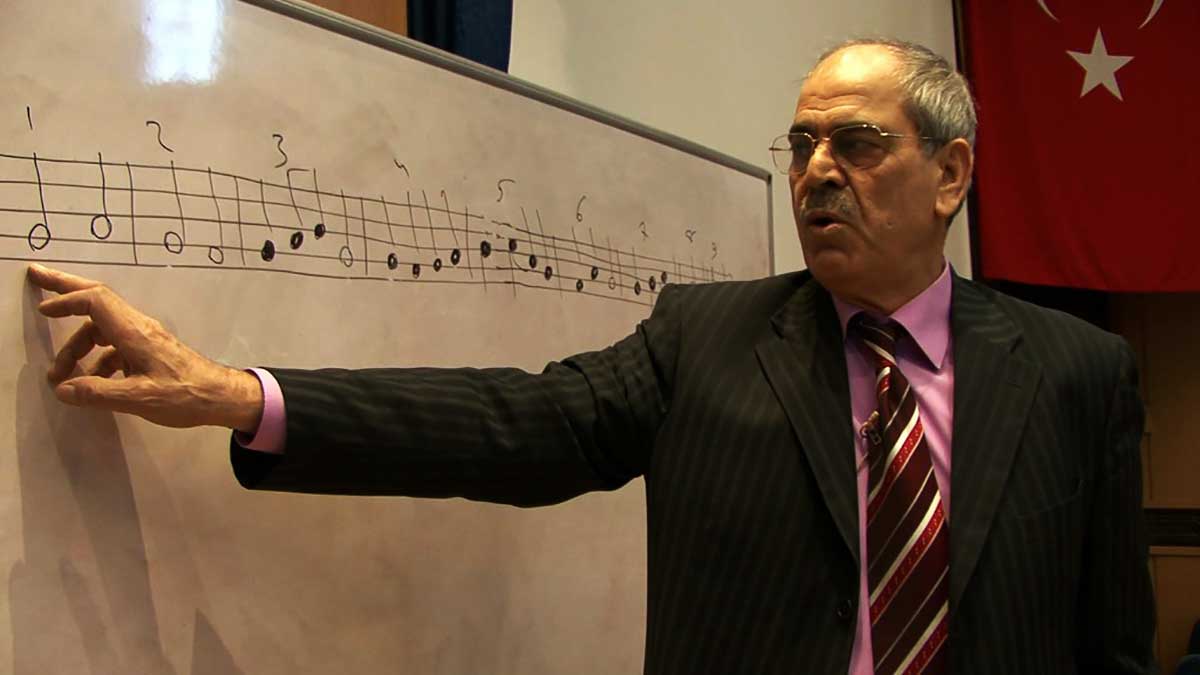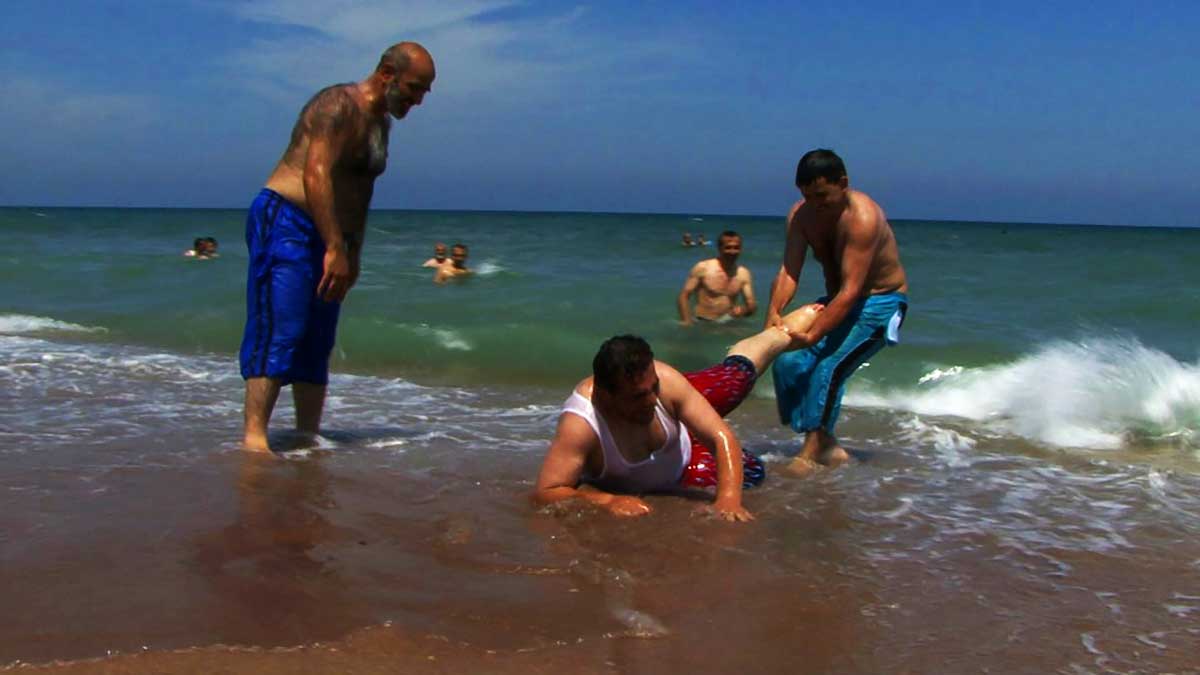Five times daily. Sometimes it wakes me up; sometimes its sound follows me on the way home from a night out. Sometimes it’s just a distant noise in the background, then again I notice it entirely consciously: The ezan, the call to prayer. Especially in Istanbul with its over 3000 mosques, the ezan is an integral element of the soundscape of the city. In his movie “Muezzin” Sebastian Brameshuber gives us an insight into the amusing as well as serious world of an element that belongs to the daily rhythm of many Turks. At the same time, he portrays the relationship between Islam and music, the Ottoman impact on the practice of Islam in Turkey and the tensions between individuality and collective conformity in this special field.
Sebastian Brameshuber filmed the “Call of Prayer Competition” in 2007 in Muezzin (2009). The competition originated in 2004 and was established as a competition to choose the best muezzin in Turkey. The film crew participated in the regional preliminary decision in Istanbul and accompanied the winner from Istanbul to the final in Edirne, where the ten winners of the preliminary rounds competed for the title. In the film the competition is just the framework, whereas the real focus is on the participants, their roots and family background, their access to music as well as the special atmosphere of the mosques and of the competition. We wanted to know more about the creation of this movie. For that reason, I´m meeting the director in Vienna.
Entering the mosque with a camera
In 2005 Sebastian came to Istanbul for the first time as a photography assistant. During a photoshoot he met the muezzin of the Süleymaniye Mosque. “I still remember how we went up the minaret and how beautiful the view was up there. It was up there that the muezzin told me about the competition. Somehow this thought got stuck in my head.” After a research in Vienna and another visit in Istanbul the idea for the movie was born.
Muezzin deals with the artistic scope of the call to prayer, its individual presentation associated with the idea of the competition. “The text and time of the ezan is given. Nevertheless, there is a small space for artistic, individual interpretation”, Sebastian Brameshuber explains. “The real art is to shape the prayer call as individual as possible in order to stand out in comparison with the rivals of neighbouring mosques. You can stand out with your quality on the one hand but also with volume and speed on the other hand. This idea of competition between muezzins, in some way working with the same mechanisms as a Hip Hop battle, had aroused my interest. The idea is based on the thought of motivating most people to come to one’s own mosque with the most beautiful call of prayer. This idea of battle is directly concretized in the competition. And so it came to the realisation of my movie in 2006.”

With very little money in his pockets and with a car full of equipment, Sebastian went to Istanbul in 2007 where he would stay the following 2.5 years. The film crew received all the necessary permits from the Presidency of Religious Affairs in Ankara. “We surely made a very interesting impression on the gentlemen who were sitting there. However, they liked our idea and gave us the permit. Actually, afterwards a special permit had to be obtained by each müftülük (the local Islamic authority) but the confirmation from Ankara was like a blank check”, Sebastian remembers.
The film crew contacted the participants of the competition of the recent years; three of them were accompanied during the competition of 2007. Habil Öndes, an educated Imam from the conservatory who teaches the call to prayer played a central role. “They are proud of what they do. They see themselves in the tradition of the Ottoman Muezzins who accomplished the heyday of musicality in the mosques.” But the protagonists have differing opinions about the position of the muezzin and whether he is an artist or just God´s instrument – and therefore differing opinions about the status of individuality in Muslim culture.
The everyday life of muezzins
Different protagonists allowed the crew to get an insight into their private and everyday life. Hence, Muezzin portrays the daily life of the religious community in a subtle way. Sebastian Brameshuber orbits the issue and approaches it spirally. It is not a direct statement that interested the director “but what things tell from its own initiative.” Thus, ambivalences in the belief systems of the protagonists such as the discrepancy between science and religion or the structures of an Islamic family are being visualised.
Although these issues define the core of the movie, they stay in the background and are not directly addressed. Instead, they basically naturally enrol in front of the viewers’ eyes by the visualisation the situations. One scene for example shows the imams playing beach-volleyball at the Black Sea. “This scene explains much more than what is actually happening. It makes a statement concerning the culture since only men are present at this happening.”
The view from the outside
Sebastian Brameshuber describes himself as being very interested in politics. During his stay in Istanbul, he intensely researched Turkish history, politics and sociology. People told him that his perspective presented in the movie was very “Turkish” and did not give the feeling of being made by a foreigner. “Well, if I am watching the film I very much see the foreign perspective on the subject. However, apparently the movie gives enough “insider” perspective; it was also successfully screened in Turkey.”
Sebastian thinks that “such a movie has not yet been made in Turkey.” Making movies is an activity that is accessible mainly for the rich, secular and western oriented Turkish upper class. “I think a lot of secular people in Turkey that have studied film or made films, are not interested in religion in this way. And religious people that show interest in moviemaking mostly don’t have the necessary distance and tend to romanticise the topic. People here might make a television documentary but surely not a cinema documentary with artistic claim.”
Sebastian Brameshuber has done it anyway. For me, Muezzin is a great enrichment because it gives a picture to the voice that hangs all over Istanbul, he consequently demystifies it and fills a gap for my understanding of Turkish culture. Nowadays, after watching the movie, I catch myself noticing different pitches and I try to distinguish different melodies…
[su_youtube_advanced url=”https://www.youtube.com/watch?v=KEWAH2T1LOk” width=”640″ showinfo=”no” rel=”no”]
Text: Elisabeth Nindl Translator: Serap Güngör


